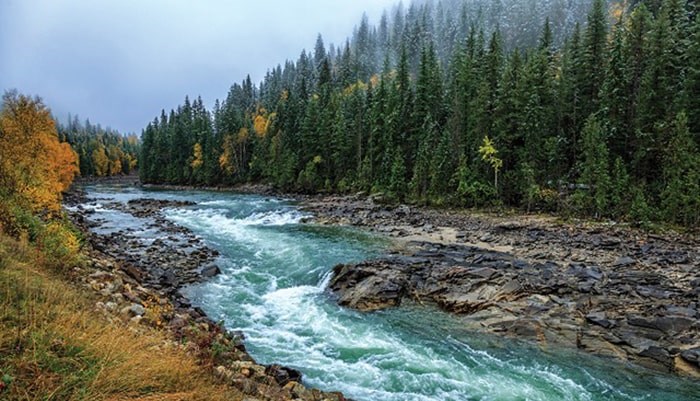A report released last month warns of the "serious problem" of water scarcity in B.C., with roughly 63 per cent of the provincial population living in water-stressed areas.
The study, produced by the Watershed Watch Salmon Society, found that the areas with the highest levels of water stress, while only covering 3.7 per cent of the province, represented nearly a quarter of B.C.'s population.
 The “myth of abundance” in B.C. has prevented adequate action on water scarcity, which non-profit Watershed Watch warns in a new report is a “serious problem” in much of the province. Photo: Shutterstock
The “myth of abundance” in B.C. has prevented adequate action on water scarcity, which non-profit Watershed Watch warns in a new report is a “serious problem” in much of the province. Photo: Shutterstock
"I think it's really serious and that's the real reason behind putting this report out," said Tanis Gower, science and policy advisor for Watershed Watch. "Those of us in the resource management field, we know, most of us, and lots of us have known for a long time, but a lot of people do not. My mission was to demonstrate just that, how we do not have abundant water."
The report's intent, Gower stated, was to dispel the "myth of abundance" that continues to persist in B.C.
"If you look at a map of our province and all the marketing materials around 'Beautiful British Columbia' and all the recreational opportunities we have, it all shows water," Gower said. "Until people became more aware of the droughts and the wildfires, before our water laws changed in 2016, we were chugging along with a lot of people under the impression that it wasn't a problem."
Prior to changes made to B.C.'s Water Sustainability Act three years ago, groundwater was available for use by any landowner, with no government authorization required. Most water users don't measure or report their water use, and groundwater use is "only partially integrated into B.C.'s licensing regime," the report said. This, in turn, has led to "a significant data deficit for water availability and water scarcity in B.C."
Since the update to the act, there are now an estimated 20,000 groundwater use licenses that landowners must apply for, which Watershed hopes will lead to a better understanding of B.C.'s water supply. Gower said the lack of reporting and monitoring have primarily been an issue of funding and priorities in Victoria.
"Until [the province] brought groundwater licensing into the water management scheme, there was just this big hole they couldn't fill with data. They just didn't know," she said. "It takes a lot of effort and resources to get the right information, and that's scaling up significantly—but it's going to take time."
Groundwater also plays a crucial role in the health of salmon, particularly as B.C.'s summers have grown hotter and drier. Groundwater maintains water flows in streams and other bodies of water during dry periods, and regulates water temperature for cool-water salmon species.
"In many places, the groundwater is what keeps the fish alive because when it's not raining, where's the water coming from?" Gower explained. "We have long seasons without rain and that's typical for our climate, but now they're getting longer and hotter. There are many salmon species that use the streams in the summer when the juvenile fish are rearing, so if there's not in-flows, like base flows, which come from groundwater, then there's no flows. It's that linked."
Watershed listed a series of recommendations to improve B.C.'s water situation, including dedicating resources to improved water monitoring and measuring; improving the implementation of groundwater licensing; establishing province-wide, legally enforceable environmental flow regulations; and providing adequate, stable funding for water management and governance. Gower believes the political appetite to implement the recommendations varies.
"I think that for some aspect of our recommendations, the political appetite is really high and I think there's an understanding of the reasoning behind what we're asking for," she said, adding that the province is keen on groundwater licensing.
"We're also asking for environmental flows to be regulated, and there is an appetite to do that, but maybe not in the way we're asking, which is too bad. But as long as the flows are being left in the river, they'll decide on their best approach for implementing that," Gower said. "We're asking for a tap-in, and there's so much work involved. I do feel for the provincial people whose job it is to roll this out. And yet, we don't have time to wait in some of our rivers ... There's a lot of work ahead of us."
To read the full report, visit Watershed Watch.



